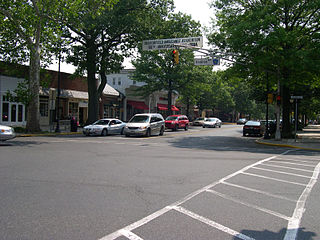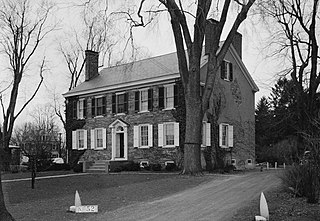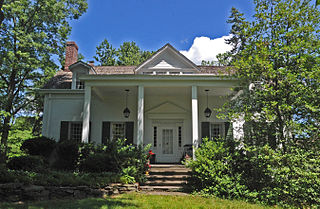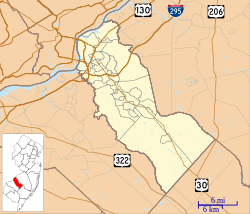
Haddonfield is a borough located in Camden County, in the U.S. state of New Jersey. As of the 2020 United States census, the borough's population was 12,550, an increase of 957 (+8.3%) from the 2010 census count of 11,593, which in turn reflected a decline of 66 (−0.6%) from the 11,659 counted in the 2000 census

The Indian King Tavern was a colonial American tavern in Haddonfield, Camden County, New Jersey, United States, which was the site of a 1777 meeting of the New Jersey Legislature adopted its Great Seal. It was the first State Historic Site, adopted as such in 1903. Its original structure remains largely intact. It is listed on the National Register of Historic Places.

Mauricetown is a census-designated place and unincorporated community that is part of Commercial Township in Cumberland County, in the U.S. state of New Jersey.

The William Trent House is a historic building located at 15 Market Street in Trenton, Mercer County, New Jersey. It was built in 1719 for William Trent and is the oldest building in Trenton. He founded the eponymous town, which became the capital of New Jersey. It has served as the residence for three Governors. The house was added to the National Register of Historic Places and listed as a National Historic Landmark on April 15, 1970, for its significance as an example of Early Georgian Colonial architecture.

The Lawrence Township Historic District is a 550-acre (220 ha) historic district encompassing the community of Lawrenceville in Lawrence Township, Mercer County, New Jersey, United States. It was added to the National Register of Historic Places on September 14, 1972 for its significance in architecture, landscape architecture, literature, military history, and transportation. The district includes 45 contributing buildings.

The James Whitall Jr. House is located at 100 Grove Avenue in the borough of National Park, Gloucester County, New Jersey. The house was built in 1766 and documented by the Historic American Buildings Survey (HABS) in 1937. It was added to the National Register of Historic Places on February 6, 1973, for its significance in architecture.

The Bodo Otto House, also known as the Otto–Tonkin House, is a historic house located at the corner of County Route 551 and Quaker Road in the Mickleton section of East Greenwich Township in Gloucester County, New Jersey, United States. The house was built in 1766 and documented by the Historic American Buildings Survey (HABS) in 1936. It was added to the National Register of Historic Places on December 12, 1976, for its significance in military history.

Pomona Hall is a colonial mansion located at 1900 Park Boulevard and Euclid Avenue, in Camden, Camden County, New Jersey, United States, that operates as a museum by the Camden County Historical Society. The first building on the site was constructed in 1718, while construction of the more substantial mansion house was started in 1726, with later additions made in 1788. It is not known when the house was first called Pomona Hall; but it is marked on Hill's Map of Philadelphia and Environs, published in 1809.

Greenfield Hall is located in Haddonfield, Camden County, New Jersey, United States. The building was built in 1747 and added to the National Register of Historic Places on June 5, 1974. The Historical Society of Haddonfield operates a museum within the building.

John Holmes House, also known as the Cresse–Holmes House, is located at 504 U.S. Route 9 North in the Cape May Court House section of Middle Township in Cape May County, New Jersey. It was added to the National Register of Historic Places on June 12, 1979, for its significance in vernacular Georgian architecture. It was documented by the Historic American Buildings Survey in 1992.

The Gov. Charles C. Stratton House, also known as Stratton Hall or Stratton Mansion, is located at 538 Kings Highway, near Swedesboro, in Woolwich Township, Gloucester County, New Jersey, United States. The house was built c. 1794 and documented by the Historic American Buildings Survey (HABS) in 1936. It was added to the National Register of Historic Places on January 29, 1973, for its significance in architecture and politics. The house was the home of New Jersey Governor Charles C. Stratton.

The Village Inn, also known as the Davis Tavern, is located at the corner of Water and Main Streets in the borough of Englishtown in Monmouth County, New Jersey. The oldest section of the building dates to 1732. It was documented by the Historic American Buildings Survey in 1936, with addendum in 1984. The tavern was added to the National Register of Historic Places on November 13, 1972, for its significance in architecture and military history.

The Martin Berry House is located in Pompton Plains in Pequannock Township, Morris County, New Jersey, United States. The house was built in 1720 and documented by the Historic American Buildings Survey (HABS) in 1939. It was added to the National Register of Historic Places on June 19, 1973, for its significance in architecture and settlement. Built by the son of one of the first settlers to the Pompton River region, the pre-Revolutionary War building has been little altered since its construction.

Joseph Cooper House is located in Camden, Camden County, New Jersey, United States. The house was built in 1695 and added to the National Register of Historic Places on March 14, 1973, for its significance in architecture. A fire, about 2005, destroyed the roof. The ruins of the building are planned to become a pavilion in the surrounding park.

Stephen Decatur Button was an American architect and a pioneer in the use of metal-frame construction for masonry buildings. He designed commercial buildings, schools and churches in Philadelphia, Pennsylvania, and Camden, New Jersey; and more than 30 buildings in Cape May, New Jersey.

The Brainerd Schoolhouse is a one-room schoolhouse located at 35 Brainerd Street in Mount Holly Township, Burlington County, New Jersey, United States. Built in 1759, it is the oldest building of its type in the state and now a museum. Listed as the John Brainard School, it was documented by the Historic American Buildings Survey in 1936. Listed as the Old Schoolhouse, it was added to the National Register of Historic Places on November 26, 2008, for its significance in education. It is a contributing property to the Mount Holly Historic District. It is owned and operated by the National Society of the Colonial Dames of America.

The Millstone Historic District is a historic district located in Millstone, Somerset County, New Jersey. The district was added to the National Register of Historic Places on September 13, 1976 for its significance in education, military history, settlement, and transportation. It includes 58 contributing buildings.

The Chester House Inn, also known as the Chester Inn and the Brick Tavern, is a historic building at the corner of Main Street and Hillside Road in Chester Borough, Morris County, New Jersey. It was built from 1810 to 1812 by Zephaniah Drake. Known as the Chester House Hotel, it was documented by the Historic American Buildings Survey (HABS) in 1937. The inn was added to the National Register of Historic Places for its significance in architecture, commerce, and education on July 18, 1974.

Franklin Corners is an unincorporated community located along the Passaic River at the intersection of County Route 613 and U.S. Route 202 in Bernards Township of Somerset County, New Jersey. In the 19th century, it had a grist mill, saw mill, general store, school, and several houses. The Franklin Corners Historic District, featuring Van Dorn's Mill, was listed on the National Register of Historic Places in 1975.
























